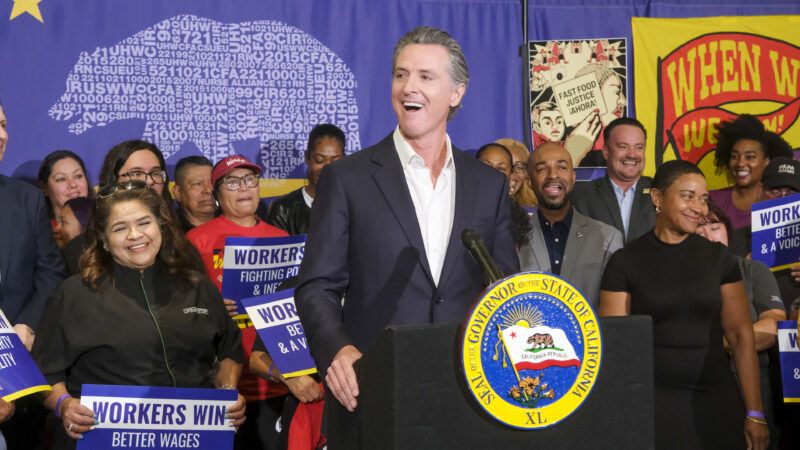Of Course Special Interests Shaped California's New Minimum Wage Law
Gov. Gavin Newsom's response to allegations of favoritism only serve to underline how the entire fast food minimum wage law was a giveaway to his buddies.

California Gov. Gavin Newsom is pushing back against claims that he sought to include a special exemption in a new minimum wage law to help a longtime friend and donor—but the governor's objections only underline how the entire law was a giveaway to his political allies.
Starting next month, fast-food chains operating in California will have to pay workers at least $20 per hour, even though the minimum wage for other jobs in the state will remain at $16 per hour. Newsom signed the bill to create that higher wage mandate, but the law includes a special carve-out seemingly tailored to exempt Panera Bread (and other chains that sell bread as a standalone menu item). Newsom had pushed for that exemption, Bloomberg reported earlier this week, as a favor to Greg Flynn, owner and CEO of the Flynn Restaurant Group, which operates 24 Panera locations in the Golden State.
After the story took off in the media, a spokesman for the governor's office claimed the allegation of favoritism was false. Newsom "never met with Flynn about this bill and this story is absurd," wrote Alex Stack in a statement to Reason and other media outlets that covered the story. "Our legal team has reviewed and it appears Panera is not exempt from the law."
The first claim might be true in only the narrowest sense. The Associated Press has confirmed that Flynn met with the governor's staff regarding the minimum wage bill and that he suggested exempting "restaurants like bakeries, bagel shops and delis" from the higher minimum wage law. Flynn denied speaking to Newsom directly, but it certainly appears that he attempted to exercise some influence over the lawmaking process.
Meanwhile, the governor's office's claim that the exemption doesn't apply to Panera only raises other questions—like, why is that exemption there at all?
That's a question that reporters in Sacramento have seemingly been trying to answer for months. Asked directly about the bakery exemption at a press conference last year, Newsom said it was "part of the sausage making" of the legislative process. In the wake of the Bloomberg story, Newsom's office has not offered a better explanation for the carve-out. Until that changes, the questions will persist.
"If [Newsom] is unable to provide a better justification for this carve-out, it raises serious questions about the integrity of his administration," a group of Republican lawmakers wrote in a letter requesting that state Attorney General Rob Bonta investigate the matter.
Newsom's explanations about the carve-out seem to be "falling apart in real time, particularly because Californians are accustomed to watching this administration hand out favors to its friends," Will Swaim, president of the California Policy Center, tells Reason.
Swaim drew a parallel to the aftermath of the passage of California's Assembly Bill (AB) 5 in 2019, which effectively banned freelancing in many industries. After newspapers complained that the law would make it more difficult for them to use freelance labor, Newsom backed a short-term and then a longer-term exemption for the industry.
Of course, the debate over the narrow bakery exemption to the minimum wage law seems to miss the larger point: the entire law is a bizarre exemption from the state's existing minimum wage statute. Maybe a special interest and personal friend influenced that one section of the new law, but there is no doubt that other special interests—labor unions that give huge campaign contributions—are the reason why the rest of the law singles out fast food restaurants while effectively exempting other employers.
In short: Newsom's claims that special interests didn't influence one part of the bill would be more believable if special interests hadn't obviously influenced the entire bill.
"This was a bad bill to begin with—imposing an unsupportable minimum wage on businesses that operate on razor-thin margins has already raised menu prices and accelerated layoffs in the industry," says Swaim. "Its victims will be small franchisees who don't have Panera's pull and workers who are now facing mass layoffs."


Show Comments (26)